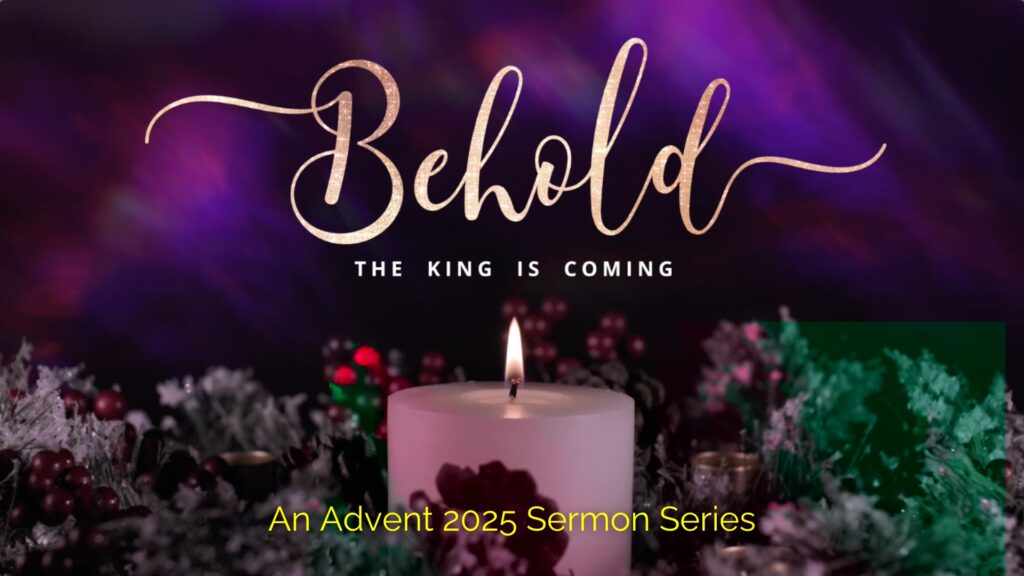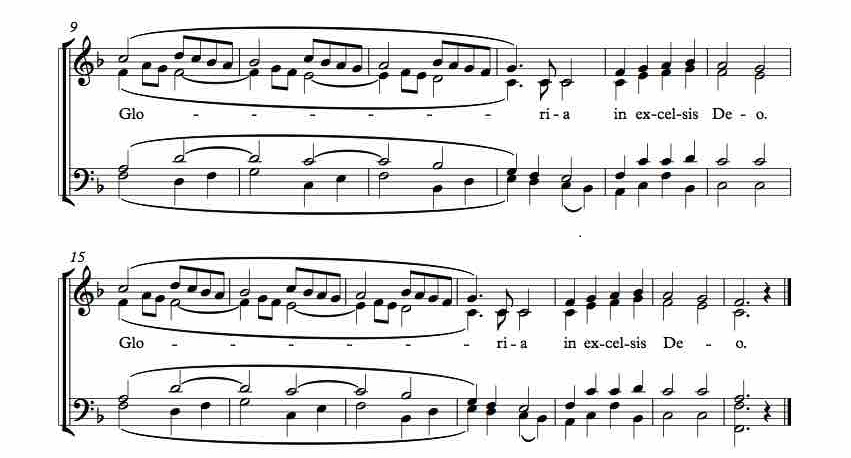
DECEMBER 2025 PASTOR’S CORNER — ADVENT: THE KING IS COMING

And Mary said, “My soul magnifies the Lord,
and my spirit rejoices in God my Savior,
for he has looked on the humble estate of his servant.” — Luke 1:46-48
There’s a tension lurking underneath the surface of our celebrations of Christmas each year. It’s one of those things that can be easy to overlook, but once you see it, it’s really hard to unsee it. In the birth of our Savior, Jesus Christ, we celebrate the fulfillment of all of the prophecies in the Bible that speak to the redemption of all of humanity and creation. Over the course of this month, we will sing of joy, while many are filled with sorrow and struggle with depression. We sing of peace, while wars rage around the world and in our hearts. We sing of love, and yet are surrounded by so much hate. We sing of hope, but wonder, deep down, if anything will ever change. Wasn’t Jesus supposed to change all of this?
Consider Mary’s song of joy of what God has already done in The Magnificat: “He has shown strength with his arm; he has scattered the proud in the thoughts of their hearts; he has brought down the mighty from their thrones and exalted those of humble estate; he has filled the hungry with good things, and the rich he has sent away empty.” (Luke 1:51-53) I look around the world today, and I see a lot of proud and mighty people still boasting. I see those of humble estate still struggling. The hungry are still starving; the rich are still hoarding. We know Jesus accomplished these things, because the Bible is very clear that He did, but why is there still so much suffering and injustice, sin and brokenness? It is the season of Advent that helps provide an answer.
In her magnificent book, Advent: The Once & Future Coming of Jesus Christ, Fleming Rutledge writes,
Karl Barth exclaimed, “What other time or season can or will the Church ever have but that of Advent!” This illuminates the present dimension of the season. It locates us correctly with relation to the first and second comings of Christ. Advent calls for a life lived on the edge, so to speak, all the time, shaped by the cross not only on Good Friday but wherever and whenever we are, proclaiming his death to be the turn of the ages “until he comes” (I Cor. 11:26)… In a very real sense, the Christian community lives in Advent all the time. It can well be called the Time Between, because the people of God live in the time between the first coming of Christ, incognito in the stable in Bethlehem, and his second coming, in glory, to judge the living and the dead. In the Time Between, “our lives are hidden with Christ in God; when Christ who is our life appears, then we also will appear with him in glory” (Col. 3:3–4). Advent contains within itself the crucial balance of the now and the not-yet that our faith requires. (Pg 7)
Everything the Bible says about what Jesus accomplished in His incarnation is absolutely true. God is now with us in Jesus Christ. The power of sin and death has been broken. The proud have been brought down and the humble lifted up. Prisoners freed. The blind given sight. The lost found. The broken soul made whole. And yet. And yet, all of these things are also yet to be completed. As Jesus said, “The time is fulfilled, and the kingdom of God is at hand; repent and believe in the gospel.” (Mark 1:15) Jesus has absolutely accomplished all of these things, but He has not yet completed all of these things. Advent is the season that reminds us of this tension and invites us into it. It is the season of, as Rutledge said, “the Time Between.”
When Jesus returns, the Kingdom of God will finally be consummated. The work begun with His first coming will be completed. That which has happened now in part will then be completed in full. It is the season of Advent that keeps our focus and our hope on that great and wonderful day. Advent doesn’t merely acknowledge the tension of the already/not yet, it embraces it. Just as in the incarnation our Savior came to earth and met us where we are, the season of Advent reminds us that He is still doing the same today, and that one day He will finish what He started.
This Advent, we’ll take a look at how each of the Gospels tell the story of the birth of our Savior (except for Mark, who doesn’t include a birth narrative), and how each points us to His return. We’ll begin our Advent celebration with a service of prayer, scripture and song, using Mary’s Magnificat as our guide to prepare our hearts and our souls to worship deeply and well this holiday season. As you prepare for and celebrate the birth of our Savior, keep your eyes focused on His return. Joy to the world, the King is coming!
For we know in part and we prophesy in part, but when the perfect comes, the partial will pass away. When I was a child, I spoke like a child, I thought like a child, I reasoned like a child. When I became a man, I gave up childish ways. For now we see in a mirror dimly, but then face to face. Now I know in part; then I shall know fully, even as I have been fully known. (1 Cor. 13:9-12)
Blessings,
Rev. David Garrison
Read more...

DECEMBER 2025 MILLS’ MUSINGS – GLORIA IN EXCELSIS DEO

For as long as I can remember, I have loved the music of the Christmas season. From Linus and Lucy Can Rock to You’re a Mean One, Mr. Grinch and from Frosty the Snowman to Rudolph, the Red-Nosed Reindeer, music from the animated specials of my childhood still brings a smile to my face.
Through the years, I have added an appreciation of more substantial works, including Antonio Vivaldi’s Gloria and George Friedrich Handel’s Messiah. Although they were written about 300 years ago, both are still widely performed when Christmas time is here, eloquent evidence of music’s ability to convey profound truths to human souls.
And I never tire of playing or singing Christmas carols. My favorite is Angels We Have Heard on High. The melody comes from a traditional French piece, “The Angels in Our Countryside.” “Traditional” is one way musicians say, “We have no idea who wrote this tune.”
The author of the 10 original verses is equally unknown. We do know that in 1860, these verses were translated into English by James Chadwick, a Roman Catholic bishop from England. I was surprised when I learned that it was not until 1966, when the American composer Austin Lovelace was preparing to include it in a new United Methodist hymnal, that this centuries-old carol was first given the title “Angels We Have Heard on High.”
One of my earliest musical memories is learning to sing this carol for my home church’s Christmas pageant. This annual event was the standard small church bathrobe drama, complete with shepherds and angels, wise men and a plastic baby Jesus. But with each tableau, the Junior Choir sang a verse or two from an appropriate carol. When we got to Angels We Have Heard on High, I was asked to sing the alto line for the refrain.
That was a revelation.
As the carol’s refrain began, the sopranos held their note for several beats while the altos sang shorter notes below them. Then we held a long tone while the sopranos kept changing notes above us. I was hooked. It would be years before I learned that the technical term for that musical procedure is “polyphony,” literally, “many voices.” It took me even longer to recognize that this compositional technique provides an ideal way to set the text of the carol’s refrain, which is taken from Luke 2:13-14:
And suddenly there was with the angel a multitude of the heavenly host praising God and saying,
“Glory to God in the highest,
and on earth peace among those with whom he is pleased!”
By definition, a multitude of angels would include many voices. Using what a former pastor called my “sanctified imagination,” I can imagine that the voices of the heavenly host ranged from low to high, each with its own distinctive timbre. And while I can’t imagine what that heavenly choir sounded like when they praised God from the sky, I’m sure that what the shepherds heard was glorious and that it glorified God in the highest.
As together we begin this new Christian year, journeying through Advent to Christmas with the music of the season ringing in our years, let me encourage you to listen a bit more carefully to the carols you’ll hear and sing. For even though we know them all by heart, if we pay a little more attention to both the words and the music, we just may find our souls refreshed in unexpected ways.
Gloria in excelsis Deo.
Read more...

November 2025 MILLS’ MUSINGS – FOR ALL THE SAINTS

On Sunday, November 2, Northminster will add an extra element to our usual order of worship – a necrology. Names of church members who have died in the past 12 months will be read aloud and followed by a single chime. It’s a simple but meaningful ritual, a practice that reminds us of two important truths about our faith. But first, a bit of history.
In the Roman Catholic Church, All Saints Day is annually celebrated on November 1st, while All Souls Day is November 2nd. In many Protestant denominations, the first Sunday in November unites these celebrations on what we call All Saints Sunday.
While there are understandable differences between Catholic and Protestant traditions, a central theme in each is celebrating the transition of believers from the Church Militant to the Church Triumphant, that is, recognizing and rejoicing with all those Christians who have finished their work on earth and now abide with God in heaven.
The first truth this celebration brings to our attention is that all Christians are saints. Both the Hebrew (OT) and Greek (NT) words translated “saint” come from a root that means “holy.” To be holy is to be set apart by God in order to serve God. Paul describes saints as “those sanctified in Christ Jesus, called to be saints together with all those who in every place call upon the name of our Lord Jesus Christ, both their Lord and ours” (1 Cor. 1:2).
Here Paul shows us that sainthood, which is also called sanctification, (being made holy), is both a position and a process. As God’s chosen people, we have been made holy through the work of Jesus Christ on the cross. We are being made holy through our cooperation with the work of the Holy Spirit in and through us. And one day we will be made holy as we reunite with the saints who reached heaven before us.
As in our worship on All Saints Sunday we remember the saints of this congregation who now worship God in heaven, we are also reminded of a second truth – that our Christian faith is built on a firm historical foundation.
I affirm the observation made by church historian Bruce Shelley, who writes: “Many Christians today suffer from historical amnesia. The time between the apostles and their own day is one giant blank. That is hardly what God had in mind.”[1]
I suspect not many of us could cite chapter and verse of the history of Northminster Evangelical Presbyterian Church. I’m quite sure vast numbers of Presbyterians have little knowledge about the ecclesiastical developments that followed Martin Luther’s 95 Theses. Even more know less about the first 1,500 years of Christian history and theology. Such knowledge gaps impede our growth as individual Christians and as a congregation. For if we don’t know how we got to where we are, where we go next is anybody’s guess.
This All Saints Sunday, let’s rejoice with the souls we have known who now rest from their labors. And in the year between this celebration and the next, let’s spend some time looking back so that we might more clearly see the way ahead.
Read more...

November 2025 Pastor’s Corner — DoorDashing Our Faith

“Hear this word, you cows of Bashan,
who are on the mountain of Samaria,
who oppress the poor, who crush the needy,
who say to your husbands, ‘Bring, that we may drink!’” — Amos 4:1
This morning I read an article in The Atlantic, “The Innovation That’s Killing Restaurant Culture.” From the article: “In 2024, nearly three out of every four restaurant orders were not eaten in a restaurant, according to data provided to me by the National Restaurant Association, a trade group. The share of customers using delivery specifically, as opposed to picking up takeout or going to a drive-through, more than doubled from 2019 to 2024. In a recently released poll by the association, 41 percent of respondents said that delivery was ‘an essential part of their lifestyle.’”
It’s difficult to understate the impact this is having on the restaurant industry. Restaurants are adapting their menus to be more cost effective and provide food that travels better. Kitchens are getting bigger, seating areas smaller. Some new restaurants aren’t designed for in-person dining at all. Ellie Cushing writes, “In effect, delivery has reversed the flow of eaters to food, and remade a shared experience into a much more individual one. If communities used to clench like a fist around their restaurants, now they look more like an open palm, fingers stretched out as far as possible, or at least to the edge of the delivery radius.”
It’s too easy to blame this shift on the pandemic, although the pandemic certainly accelerated it, as it did many other things. Like so much else, these shifts started long before a virus shut us all up inside our homes. The seismic shift happened back in the early 2000s with the dual supernovas of the development of the internet and smartphones. Twenty or so years later, every facet of our lives has radically changed. Winston Churchill once said, “We shape our buildings and afterward our buildings shape us.” We now have the ability to sit at home and have the world brought to us on a whim, but at what cost? How is that convenience shaping us?
The “cows of Bashan” were the ancient equivalent of Wagyu beef today. They were meticulously doted over and cared for so as to provide the absolute highest quality meat possible. When Amos calls the Israelites the cows of Bashan, he is saying they are lazy, fat, and indolent. As Michael McKelvey writes, Amos is painting a picture of a people who “defiantly and selfishly take advantage of others, using them for their own ends. Their concern is not for what is morally right or socially acceptable. Instead, they live unto themselves; their god is their belly.” Feeding their desires and appetites by any means necessary, they cared not at all about the consequences of their self indulgence. One might argue whether we are more or less self-indulgent than the ancient Israelites, but one thing is true: we have not counted the cost we are paying for our cultural smartphone addiction. It’s been 2,800 years since Amos wrote his prophecy, but it has come true in far more visceral ways than he ever imagined.
What makes dining at a restaurant special isn’t simply that someone else is cooking for you. It’s the entire experience. It’s the sensory experience of the aromas and the ambiance, but more than that it’s the relational experience — from the welcome extended by the host, to the courtesy of the waitress, to the attention given to your meal by the chef, to the shared fellowship of those with whom you dine. None of that can be put in a box and delivered to your door. What is lost without those experiences goes far beyond the scope of these words. This barely scratches the surface; we haven’t talked about the impact on families, jobs, the economy, and much more.
However, Amos wasn’t talking about having food delivered to your door, and neither are we. Have we taken the time to consider what we are losing by doordashing our worship, our discipleship, or our fellowship? We worship by turning on the radio or Spotify. We get our discipleship from TikTok. We find fellowship through social media. All from the comfort of our couches. But true faith is inescapably relational and experiential. True worship happens when we are gathered together with the saints (Hebrews 10:25). Discipleship occurs when “iron sharpens iron” (Prov. 27:17). Fellowship, which at its root means “connection,” requires being physically present with one another (Acts 2:42). Modern technology is reshaping everything, but it can’t change the fundamental paths of our faith.
There’s nothing necessarily wrong with doordashing your dinner when you need to, or using Spotify or TikTok. But be aware of what you are choosing when you do so, and what you are not choosing as well. Be intentional in being wise and discerning when it comes to your worship, discipleship and fellowship. Make the effort to pursue Jesus in the company of other brothers and sisters. In person. Much like dining out, our faith was never meant to be an individual experience, but a communal one.
Finally, brothers and sisters, whatever is true, whatever is honorable, whatever is just, whatever is pure, whatever is lovely, whatever is commendable, if there is any excellence, if there is anything worthy of praise, think about these things. What you have learned and received and heard and seen in me—practice these things, and the God of peace will be with you. — Philippians 4:8-9
Blessings,
Rev. David Garrison
Read more...

Fall 2025 College Care Packages

The semester is coming to a close and our college students could use some encouragement. For the first two Sundays in November (11/2 and 11/9), we will be collecting items to fill care packages for our nine NEPC college students. Please drop off non-perishable items on the table in the narthex and we will pack them up and ship them. Ideas:
-
- microwave popcorn
- Little Debbies or other wrapped snack cakes
- candy
- individual bags of chips
- Ramen noodles
- granola bars
- school supplies – pens, pencils, spiral notebooks, etc.
If you’d rather not bring items, we’d also welcome cash donations to cover the cost of shipping (roughly $10 per box for the four out of area students). We’ll also have cards available for you to sign. Let’s remember to lift up our students in prayer and continue to encourage them as they advance their education.
Kayleigh Bennett – U. of Lynchburg
Hunter Brightwell – Virginia Tech
Dani Caplinger – Old Dominion U.
Cole Chapman – Randolph College
Meg Garrison – James Madison U.
Peter Garrison – U. of AL in Huntsville
Brinna Midgley – CVCC
Jackson Moore – East Tennessee State
Read more...

News & Announcements for Sunday, October 26, 2025

3 CIRCLES EVANGELISM TRAINING – CONTINUES TODAY
You are encouraged to sign up for the 3 Circles: Turning Everyday Conversations into Gospel Conversations training class. 3 Circles is a simple way to have gospel conversations. This class meets weekly for 6 weeks at 9:30 am. Even if you missed it today, plan to join us next week!
MIDWEEK PRAYER – WEDNESDAYS @ Noon
Please join us on Wednesdays at noon for a time of prayer in the sanctuary as we bring our needs before our loving God.
COVERED DISH LUNCH – NEXT SUNDAY, After Worship
Please join us for a covered dish luncheon immediately after church on November 2. If you are able, please bring a couple of dishes to share such as a meat, vegetable, salad or dessert. It has been way too long since we had lunch together, so we hope everyone will be able to come and join in the fellowship!!
YOUNG LIFE PARENT MEETING – THURS. NOV 6, 6:30pm
Whether you are the parent of a student who currently attends Young Life, or one who would like to know more about what Young Life is, this is for you. Join us for an informational meeting where you’ll have an opportunity to meet the Young Life staff and leaders, learn more about the mission and vision of Young Life, and hear updates on how God is using this ministry in Amherst County. We look forward to seeing you there.
WOMENS BIBLE STUDY – TUESDAY, NOV. 11 @ 4PM
Join us for the November meeting on Tuesday, November 11 at 4pm. We will be starting our study of The Sermon on the Mount by Jen Wilkins. Copies of the study guide can be picked up in the church office.
MISSION FOCUS FOR OCTOBER – CHRISTMAS BASKETS
The October Mission Focus is the Christmas Baskets. Please bring items to help bring a little joy to needy families in our area. Details can be found in the October newsletter.
DOWNLOAD THE CHURCH CENTER APP
Search for “Church Center” in your favorite app store on your phone to download our app! In the app are the church calendar, small group and volunteer opportunities, the online church directory, and more.
Read more...

News & Announcements for Sunday, October 19, 2025

3 CIRCLES EVANGELISM TRAINING – CONTINUES TODAY
You are encouraged to sign up for the 3 Circles: Turning Everyday Conversations into Gospel Conversations training class. 3 Circles is a simple way to have gospel conversations. This class meets weekly for 6 weeks at 9:30 am. Even if you missed it today, plan to join us next week!
MIDWEEK PRAYER – WEDNESDAYS @ Noon
Please join us on Wednesdays at noon for a time of prayer in the sanctuary as we bring our needs before our loving God.
MEN’S BREAKFAST – WEDNESDAY, OCTOBER 22, 8:00AM
All Northminster men are invited to breakfast at Pastor Dave’s house on Wednesday, October 22 at 8 AM! There will be food, fellowship, and a topical discussion. Pastor Dave will be cooking, so you can count on plenty of bacon and coffee. Feel free to invite friends who are not affiliated with our church.
MISSION FOCUS FOR OCTOBER – CHRISTMAS BASKETS
The October Mission Focus is the Christmas Baskets. Please bring items to help bring a little joy to needy families in our area. Details can be found in the October newsletter.
YOUNG LIFE PARENT MEETING – THURS. NOV 6, 6:30pm
Whether you are the parent of a student who currently attends Young Life, or one who would like to know more about what Young Life is, this is for you. Join us for an informational meeting where you’ll have an opportunity to meet the Young Life staff and leaders, learn more about the mission and vision of Young Life, and hear updates on how God is using this ministry in Amherst County. We look forward to seeing you there.
Read more...

News & Announcements for Sunday, October 12, 2025

3 CIRCLES EVANGELISM TRAINING – CONTINUES TODAY
You are encouraged to sign up for the 3 Circles: Turning Everyday Conversations into Gospel Conversations training class. 3 Circles is a simple way to have gospel conversations. This began last Sunday but will meet weekly for 6 weeks at 9:30 am. Even if you missed it today, plan to join us next week!
SERVICE OPPORTUNITY – SATURDAY, OCTOBER 18, 9:00AM
Our church will be serving and reaching out to our community at the Monelison Bruins games on Saturday, October 18. Bruins Park is located behind Monelison Middle School and next to the Madison Heights Youth Baseball fields at 265 Trojan Dr. in Madison Heights. There will be four football games throughout the day with shifts for volunteers from 9 AM – 3:30 PM. Please sign up on the bulletin board or let Karey Garrison know if you’re able to help out.
MEN’S BREAKFAST – WEDNESDAY, OCTOBER 22, 8:00AM
All Northminster men are invited to breakfast at Pastor Dave’s house on Wednesday, October 22 at 8 AM! There will be food, fellowship, and a topical discussion. Pastor Dave will be cooking, so you can count on plenty of bacon and coffee. Feel free to invite friends who are not affiliated with our church.
MISSION FOCUS FOR OCTOBER – CHRISTMAS BASKETS
The October Mission Focus is the Christmas Baskets. Please bring items to help bring a little joy to needy families in our area. Details can be found in the October newsletter.
Read more...

News & Announcements for Sunday, October 5, 2025

3 CIRCLES EVANGELISM TRAINING – CONTINUES TODAY
You are encouraged to sign up for the 3 Circles: Turning Everyday Conversations into Gospel Conversations training class. 3 Circles is a simple way to have gospel conversations. This began last Sunday but will meet weekly for 6 weeks at 9:30 am. Even if you missed it today, plan to join us next week!
COLLEGE & CAREER BIBLE STUDY –SUNDAYS, 6PM
Join us for a weekly(ish) bible study for College & Career Young Adults this summer. We meet at the Garrisons for dinner (probably something fancy, like pizza) and then spend some time digging into God’s Word. This is a place and time you can bring your questions and whatnot as well. All young adults, ages 18-29(ish) are welcome.
WOMEN’S BIBLE STUDY – MONDAY, OCTOBER 6, 7PM
The Women’s Bible Study will meet next Monday, October 6 at 7:00 p.m. at the church. We will be starting a new study that we’re excited to tell you about Monday evening! If you haven’t come in a while or been wanting to join, this is a great time to do so. We look forward to seeing you next Monday!
WOMEN’S BOOK CLUB – THURSDAY, OCTOBER 9, 10AM
The Women’s Bible Study will meet Thursday, October 9 at 10:00 a.m. at the church. We will be reading, You Have a Calling, by our friend, Karen Swallow Prior. Karen will be at our meeting on October 9 to read parts of her book and share her motivation for writing this book. She will also answer your questions. (And if you don’t get a chance to read it, come anyway!)
MEN’S BREAKFAST – WEDNESDAY, OCTOBER 22, 8AM
All Northminster men are invited to breakfast at Pastor Dave’s house on Wednesday, October 22 at 8 AM! There will be food, fellowship, and a topical discussion. Pastor Dave will be cooking, so you can count on plenty of bacon and coffee. Feel free to invite friends who are not affiliated with our church.
MISSION FOCUS FOR OCTOBER – CHRISTMAS BASKETS
The October Mission Focus is the Christmas Baskets. Please bring items to help bring a little joy to needy families in our area. Details can be found in the October newsletter.
Read more...

September 2025 Pastor’s Corner — Picking Sides

When Joshua was by Jericho, he lifted up his eyes and looked, and behold, a man was standing before him with his drawn sword in his hand. And Joshua went to him and said to him, “Are you for us, or for our adversaries?” And he said, “No; but I am the commander of the army of the LORD. Now I have come.” — Joshua 5:13-14
It has been a trying month, at the end of a trying summer. Two politically-motivated assassinations, multiple attacks on churches, several shootings at schools and workplaces, and an awful lot of finger pointing has us all in a state of constant anxiety and tension. It seems as if every word spoken, every statement made on social media, every speech (or sermon) given is parsed to try and determine who is with us and who is against us. We know (well, presume actually) that God is on our side and want to know whether the people we read or talk to are our friends or our enemies. Perhaps God doesn’t pick sides the same way we do.
The verses above come in the middle of a very tense moment for Joshua and the people of Israel. Moses has died and Joshua was appointed to take his place. Chapter 1 of the book of Joshua recounts God’s commissioning of Joshua (God tells Joshua to “be strong and courageous” no less than three times in the first nine verses) and how he took command of the people. Chapter 2 is the famous story of Rahab and the spies in Jericho. In chapters 3 and 4, Israel crosses into the Promised Land through the River Jordan, in a scene reminiscent of the crossing of the Red Sea during the Exodus. At the beginning of chapter 5, as they prepare to begin the conquest of the Promised Land, the people of God are re-consecrated to the Lord. Just after the verses above, in chapter 6 we have the fall of Jericho. Squeezed in at the end of chapter 5 we have this very short scene with Joshua and and angel, the Commander of the Army of the Lord.
Joshua, pacing in the desert with anxiety and worry about what lies ahead (the impenetrable and impassable walls of Jericho), comes across a stranger with a sword. It’s a perfectly reasonable question to ask: “Are you friend or foe? Are you for us or our adversaries?” What stands out most about this is how the angel answers Joshua’s question. Of course the answer is, “I am for you.” Everything up to this point has shown just how thoroughly God is “for them.” They are the people of Israel, God’s chosen ones. God, himself, commissioned Joshua and directed his steps to this point. God, himself, stopped the waters of Jericho so the people could cross. God, himself, directed their re-consecration to Him. But the answer wasn’t, “I am for you.” The answer is as blunt as it is curt: “No.”
God is only ever on one side: His own. This is made most clear in Isaiah 48:9-11: “For my name’s sake I defer my anger; for the sake of my praise I restrain it for you, that I may not cut you off. Behold, I have refined you, but not as silver; I have tried you in the furnace of affliction. For my own sake, for my own sake, I do it, for how should my name be profaned? My glory I will not give to another.” (Is. 48:9-11) What God does, or does not, is based solely on what furthers His plans and increases His own glory. We get so wrapped up in presuming that God is on our side that we rarely stop to ask whether we are on His.
Almost a thousand years later, the disciples wanted to know the same thing Joshua did. After three years of following Jesus, facing the depths of despair as He was crucified and died, and then the heights of exaltation when He rose from the grave, they still thought He was on their side. Just before Jesus ascended to heaven, they asked, “Lord, will you at this time restore the kingdom to Israel?” He said to them, “It is not for you to know times or seasons that the Father has fixed by his own authority. But you will receive power when the Holy Spirit has come upon you, and you will be my witnesses in Jerusalem and in all Judea and Samaria, and to the end of the earth.” (Acts 1:6-8) Once again, Jesus doesn’t give the expected answer. Jesus basically says, “You’re asking the wrong question. But I’m going to empower and enable you to be on my side, to be my hands and feet, to carry the good news of the coming of God’s Kingdom to all corners of your neighborhoods and the globe.”
It took a long time for Israel to take possession of the Promised Land. At the end of the book of Joshua, he gathers all the people together. He reminds them of all that God has done for them from the time they left Egypt up to that moment because they were on God’s side. Joshua then issues a challenge, one that echoes through to our day. Fear the Lord, Joshua says, and put away the petty “gods” and divisions that this world tells you matter. Choose for yourself whose side you will be on: God’s, or not God’s. With Joshua I declare, as for me and my house, we will serve the Lord. What say you?
Now therefore fear the LORD and serve him in sincerity and in faithfulness. Put away the gods that your fathers served beyond the River and in Egypt, and serve the LORD. And if it is evil in your eyes to serve the LORD, choose this day whom you will serve, whether the gods your fathers served in the region beyond the River, or the gods of the Amorites in whose land you dwell. But as for me and my house, we will serve the LORD. — Joshua 24:14-15
Blessings,
Rev. David Garrison
Read more...
